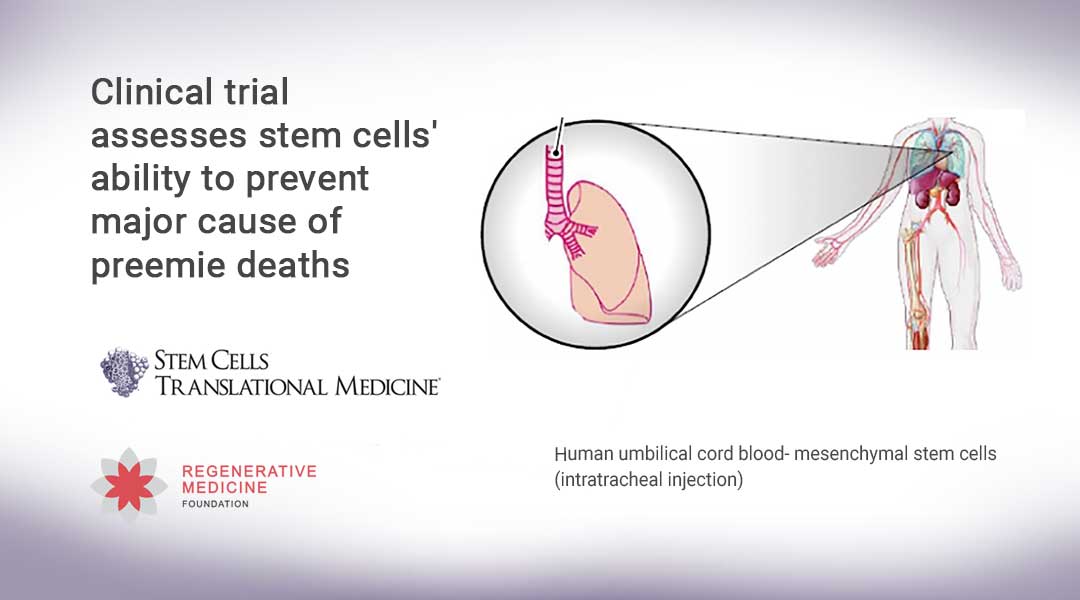Durham, NC – A phase 2 clinical trial whose results were released today in STEM CELLS Translational Medicine might point to a way to overcome bronchopulmonary dysplasia (BPD), a major cause of death in preterm infants. The study, conducted by researchers at Samsung Medical Center, Sungkyunkwan University and Asan Medical Center Children’s Hospital in Seoul, evaluates the effectiveness of treating these infants by transplanting umbilical cord blood-derived mesenchymal stem cells (UCB-MSCs) directly into their tracheas.
Early results showed signs of improvement for the most immature infants included in the trial.
BPD is a serious breathing disorder in which the lungs do not develop normally. Most infants who develop BPD are born more than 10 weeks before their due date, weigh less than 2 pounds at birth, and have breathing problems. Infections that occur before or shortly after birth also can contribute to the disorder. Despite recent advances in neonatal medicine, BPD remains a major cause of mortality and long-term respiratory and neurologic problems in premature infants.
Won Soon Park, M.D., Ph.D., of Samsung Medical Center and Sungkyunkwan University School of Medicine, and Ellen Ai-Rhan Kim, M.D., Ph.D., of Asan Medical Center Children’s Hospital, University of Ulsan, are both pediatricians who have been searching for a way to treat BPD. As such, the two were co-authors of the recent study, which was a double-blind randomized, placebo-controlled phase II clinical trial designed specifically to learn whether human UCB-derived MSC intratracheal transplantation might mitigate BPD in extremely preterm infants.
“While intratracheal transplantation of human UCB-derived MSCs has proven to be safe and feasible in recently conducted clinical trials, its therapeutic efficacy had not been assessed in a clinical setting prior to this study,” Dr. Park said.
Choosing the optimal MSCs for transplantation was also a critical point of their work, added Dr. Kim. “We focused on UCB-MSCs, as they exhibit several advantages over adult tissue-derived MSCs, including lower immunogenicity, higher proliferation capacity, paracrine potency and therapeutic efficacy both in vitro and in vivo,” she said. “Moreover, allogenic transplantation of MSCs, which come from a donor rather than the patient, might have a logistic advantage as they can be used at an early active stage of disease.”
Sixty-six preterm infants ranging in age from 23 to 28 gestational weeks (GW) were included in the study. All were on ventilators and each also had experienced significant respiratory difficulties between five and 14 days after birth. The infants were grouped by age – either 23-24 GW or 25-28 GW – and then further randomly divided into groups that received either UCB-MSCs or a placebo. The infants were then assessed for six months.
In their final analysis, the team verified that intratracheal transplantation of MSCs appears to be safe and feasible.
“At the same time, we learned that MSC transplantation did not significantly improve the primary outcome of death or severe/moderate BPD in infants in the 25-28 GW group. However, our subgroup analysis showed that the secondary outcome of severe BPD was significantly improved – dropping from 53 percent to 19 percent – in the younger 23-24 GW group,” Dr. Park said.
Dr. Kim added, “Further study with a larger sample size is required to solidly prove therapeutic benefits for infants in this group who are at the highest risk for BPD or death. Accordingly, we are now conducting an additional larger and controlled phase II clinical trial focusing on 23-24 GW infants. We hope to publish these data in the near future.”
“This study suggests that the transplantation of umbilical cord blood-derived mesenchymal stem cells directly into the tracheas of preterm babies might mitigate their breathing challenges,” said Anthony Atala, M.D., Editor-in-Chief of STEM CELLS Translational Medicine and Director of the Wake Forest Institute for Regenerative Medicine. “The data are encouraging and useful and should lead to a larger, future clinical trial.”
###
The full article, “Stem cells for bronchopulmonary dysplasia in preterm infants: A randomized controlled phase II trial,” can be accessed at https:/
About STEM CELLS Translational Medicine: STEM CELLS Translational Medicine (SCTM), co-published by AlphaMed Press and Wiley, is a monthly peer-reviewed publication dedicated to significantly advancing the clinical utilization of stem cell molecular and cellular biology. By bridging stem cell research and clinical trials, SCTM will help move applications of these critical investigations closer to accepted best practices. SCTM is the official journal partner of Regenerative Medicine Foundation.
About AlphaMed Press: Established in 1983, AlphaMed Press with offices in Durham, NC, San Francisco, CA, and Belfast, Northern Ireland, publishes two other internationally renowned peer-reviewed journals: STEM CELLS®, celebrating its 39th year, is the world’s first journal devoted to this fast paced field of research. The Oncologist®, also a monthly peer-reviewed publication, entering its 26th year, is devoted to community and hospital-based oncologists and physicians entrusted with cancer patient care. All three journals are premier periodicals with globally recognized editorial boards dedicated to advancing knowledge and education in their focused disciplines.
About Wiley: Wiley, a global company, helps people and organizations develop the skills and knowledge they need to succeed. Our online scientific, technical, medical and scholarly journals, combined with our digital learning, assessment and certification solutions, help universities, learned societies, businesses, governments and individuals increase the academic and professional impact of their work. For more than 200 years, we have delivered consistent performance to our stakeholders. The company’s website can be accessed at http://www.
About Regenerative Medicine Foundation (RMF): The non-profit Regenerative Medicine Foundation fosters strategic collaborations to accelerate the development of regenerative medicine to improve health and deliver cures. RMF pursues its mission by producing its flagship World Stem Cell Summit, honouring leaders through the Stem Cell and Regenerative Medicine Action Awards, and promoting educational initiatives.

